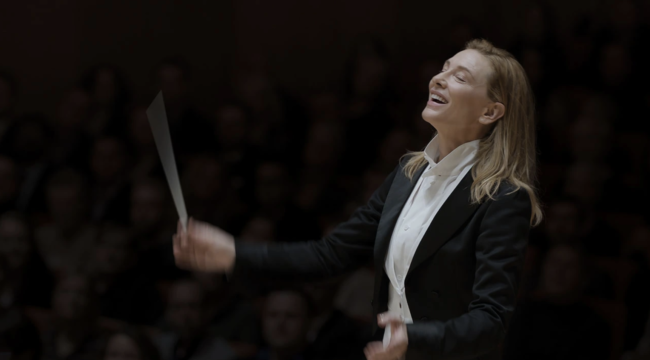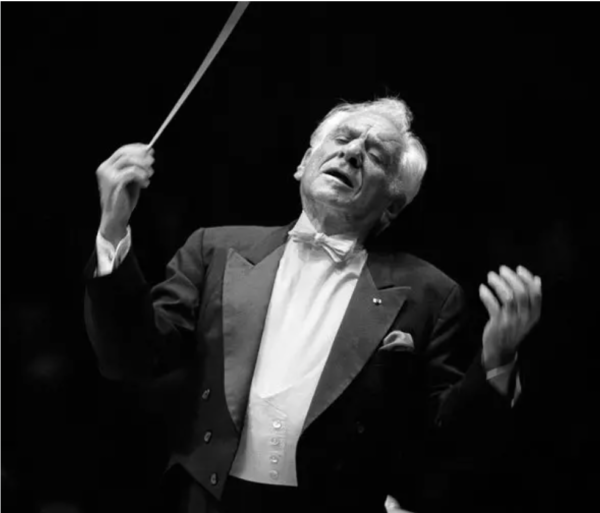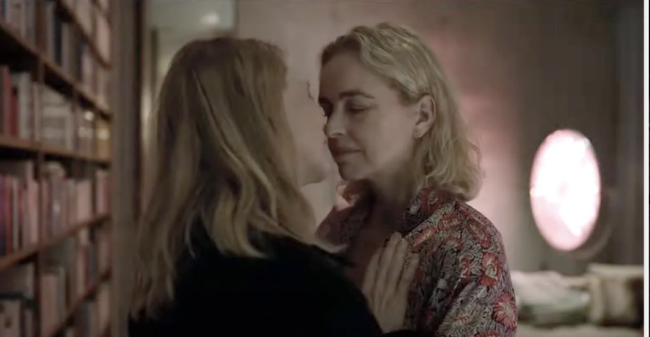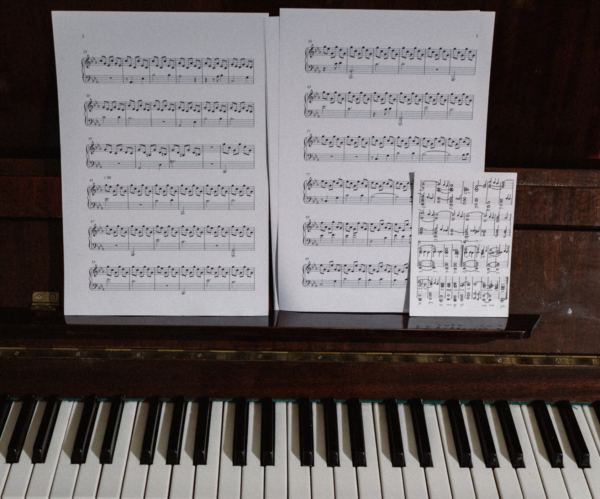GUEST POST by JANET WEIL
When I saw the trailer for “Tár” starring Cate Blanchett as classical conductor/composer Lydia Tár, I was thrilled. Women conductors remain a rare breed in that most male-dominated of all musical genres, where Western Masterpieces meet Big Money, and I had never seen a portrayal of a woman conductor on the big or small screen.

Cate Blanchett in her role as symphony conductor in T√°r (Telluride Film Festival)
A longtime fan of Blanchett, I knew she would have the presence, and the musical skills, to fill this huge role. Blanchett is so believable, and the screenplay so detailed and compelling, that people have been googling Tár as if she were a real person. (Fun film fact: Roger Ebert’s review notes “All of the musicians referenced in the film, and there are a lot of them, are real.”)
The opening scene where Lydia, an EGOT winner and star of the international orchestra scene, is interviewed at length on stage by¬ÝNew Yorker¬Ýwriter Adam Gopnik (who plays himself) is a delight. Confident and erudite, Lydia promotes her memoir, ‚ÄúT√°r on T√°r‚Äù and discusses musical ideas, her wide-ranging travels, and her mentor Leonard Bernstein.

The great Leonard Bernstein, mentor to Cate Blanchett’s character in T√°r¬Ý (The New York Times)
Lydia is principal conductor of the Berlin Philharmonic, perhaps the most prestigious symphony orchestra in the world. A woman of achievement in her 50s, a self-described “U-Haul lesbian” with a beautiful violinist wife and adopted daughter, admiring colleagues, and an upcoming recording of Mahler’s 5th Symphony, Lydia is at the height of her powers.
Back in Berlin, as the complicated plot reveals Lydia’s relationships with 3 women Рdevoted assistant and would-be assistant conductor Francesca (Noémie Merlant); wife Sharon (Nina Hoss); and young Russian cellist Olga (Sophie Kauer) – along with her attempts to compose a new piano piece and to produce her interpretation of the one Mahler symphony she has not yet recorded, Lydia’s life unravels.

A domestic scene from “T√°r” with Cate Blanchett and Nina Hoss, as a couple
I felt increasing dismay at scenes showing this strong and brilliant woman as tyrannical to students and colleagues, predatory to young women musicians, and mendacious when confronted, including by social media “evidence.” Yet another Old(er) Woman as Monster trope.
The climactic scene comes when Lydia, her professional life in ruins, storms the stage as the Berlin Philharmonic plays Mahler’s 5th, with her stolen, marked-up score used by an envious male conductor. I found myself cheering Lydia on as she strides to the podium, demanding that the musicians attend to her direction, not her rival’s. “Yes! Reclaim what he has appropriated! Take back your space! Conduct your orchestra!” I inwardly raged.

How rare and needed are scenes of women reclaiming their power and winning those battles, especially old(er) women who, like Lydia, eschew feminine glamor and primary attachments to influential men.
My expectations of a sympathetic portrait might have been tempered if I had looked first at the writer/director of “Tár,” Todd Field, himself a musician and former actor. His most famous previous film was the (to me) loathsome but award-winning “Little Children.” An adoring portrait of Female Classical Musician as Genius is probably never going to be directed by a man, sadly, and certainly not by Field.

Todd Field, director of¬Ý “T√°r ” (The New York Times)
Despite my disappointments with this major, and undoubtedly soon-to-be award-winning, film, I would advise anyone who loves classical music to see “Tár.” Many remarkable scenes, Blanchett’s passionately physical performance, and its explorations of music and noise, make it worth your time.
But go forewarned, preferably with a friend whom you can talk about your feelings afterward. See it in the daytime if you can, so that its nightmarish ending can dissipate before bed. Its images and ideas may linger in your mind. They certainly did, and do, for me.

The author recommends seeing “T√°r” with a friend to compare notes post-movie
 A retired ESL teacher and fired-up climate/eco activist, Janet Weil lives in Portland, Oregon with her husband. She enjoys spending time with her extended family, and in the great bookstores and libraries in the metro area.¬Ý Janet¬Ýis active on the Veterans For Peace Climate Crisis and Militarism Project, and when not engaged in activism, enjoys photography, poetry, and walks in the Japanese Garden.
A retired ESL teacher and fired-up climate/eco activist, Janet Weil lives in Portland, Oregon with her husband. She enjoys spending time with her extended family, and in the great bookstores and libraries in the metro area.¬Ý Janet¬Ýis active on the Veterans For Peace Climate Crisis and Militarism Project, and when not engaged in activism, enjoys photography, poetry, and walks in the Japanese Garden.






